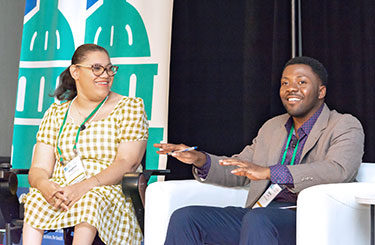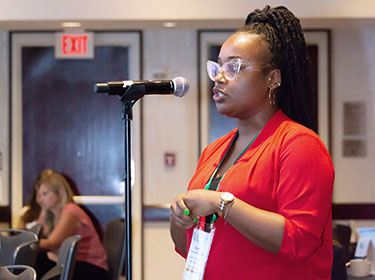U.S. public health professionals are facing both new and continuing barriers in their quest to improve the health of the public. But well-crafted policies with community buy-in can help break through those obstacles.
That was one of the take-home messages from APHA’s fourth annual Policy Action Institute, held in Washington, D.C., and online on June 14. Hundreds of health professionals and students attended the day-long event, which shared ways that innovation, partnerships and policy can boost health.
Among the barriers that have made delivery of public health services more difficult recently are misinformation, disinformation and partisan politics. While not new, the issues have come to the forefront during the COVID-19 pandemic, stymying work to end spread of the disease.
Institute speaker Steve Hamill, senior vice president of policy advocacy and communication at Vital Strategies, compared the surge in misinformation to tactics used by the tobacco industry, which for decades denied health risks and shared false information. Public health fought back by instituting health warnings, purchasing restrictions, taxes and other policies, which drove down smoking rates.
Research shows that employing measures to combat misinformation, such as removing content that has been disproven, shutting down bad actors on social media and quickly debunking false information, can counter falsehoods. Another tactic that has shown promise is empowering trusted messengers, such as barbers, ministers and community leaders, to speak about the importance of vaccination. Messengers become a “megaphone” for COVID-19 prevention, Hamill said.
Public health leaders need to get better overall at talking to Americans about the way public health measures benefit them, according to Brian Castrucci, DrPH, MA, executive director of the de Beaumont Foundation. Science and vaccination opponents are often well-funded and have cohesive messaging, helping them to sow doubt and undermine public health. Community allies can play a critical role in rebuilding trust.
“Elected leaders, faith leaders, community leaders can have more affect on our health than a physician,” Castrucci said. “One policy can improve the health of more people than a physician could in an entire career.”
Bringing community into work on public health policies pays off, according to Keshia Pollack Porter, PhD, MPH, chair of the Department of Health Policy and Management at Johns Hopkins Bloomberg School of Public Health.
She pointed to urban “play street” programs, where roads are blocked off to allow children to play for a few hours. When researchers brought the concept to rural areas, they found that each play area turned out differently. Some sites used areas other than streets or combined the activity with other local events. The project underscored the importance of getting community input on public health interventions, Porter said.
Innovative partnerships can also improve community health, according to Carrie Butler, MPH, MPP, executive director of the Utah Public Health Association. The state’s booming technology industry was leveraged to build momentum to fight proposed bills to limit public health authority, for example. When UPHA and other health organizations partnered with tech companies on state public health issues, Utah officials took notice because Big Tech was involved.
Nonprofit and government health leaders can also leverage funding to improve public health at the community level, according to Bechara Choucair, MD, senior vice president and chief health officer for Kaiser Foundation Health Plan Inc. and Hospitals. The foundation’s Thriving Communities Fund, launched in 2018 with $200 million, is on track to create and preserve 15,000 units of affordable housing by 2025.
Among those who have benefited from the Kaiser Foundation investment are residents of Oakland, California, where funds were used by the East Bay Asian Local Development Corporation to acquire and improve an apartment building and offer affordable rents. In April, the Kaiser Foundation announced it would double its commitment to Thriving Communities Fund. The $400 million investment will help create or preserve 30,000 affordable care units before 2030.
At the federal level, work is continuing to support COVID-19 vaccinations for all eligible Americans, noted Ashish Jha, MD, MPH, White House COVID-19 response coordinator and the Policy Action Institute’s opening speaker. As the institute was being held, U.S. Food and Drug Administration advisors were clearing the way for COVID-19 vaccines to be used in children ages six months to 5 years. Every state but Florida had placed orders with the federal government for vaccine supplies for young children as of this week.
Almost 67% of eligible Americans were fully vaccinated against COVID-19 as of June 16, according to the Centers for Disease Control and Prevention. One of the reasons for that accomplishment was a U.S. policy that allowed anyone to receive their vaccinations for free, regardless of insurance coverage. The policy remains in place for both adults and children, Jha reminded institute attendees.
“As we transition (to a new phase of the pandemic), we must make sure the underinsured and uninsured are still getting vaccinated,” Jha said.
States are expected to play a key role in maintaining access for another type of health care in coming months, according to Jacqueline Ayers, JD, senior vice president of policy, organizing and campaigns at Planned Parenthood Federation of America. Given the possibility that Roe v. Wade will be overturned by the U.S. Supreme Court this month, Ayers encouraged states to cement access to contraception and increase Medicaid reimbursement for sexual and reproductive health care. At the federal level, she encouraged the Biden administration to enforce federal law and support H.B. 3825, the Free Choice of Provider Act, which would allow people on Medicaid to choose their reproductive health care provider; in Texas, for example, due to a state court ruling, Medicaid recipients can be banned from receiving health care at a Planned Parenthood.
“Abortion is health care,” Ayers said to applause. “It is essential.”
Even as attacks on science and health measures continue, the work of public health professionals remains vital. Choucair called on workers to hold steady, believe in their mission and use their skills to “build power” for policy change.
“We cannot hope to rebuild trust with the public if we are not confident in our ability to work together as health systems, public policymakers and public health leaders — we cannot reenergize a wary public to engage in protective measures, we can’t explain those measures with clarity and confidence and we cannot heal our traumatized and burnt-out workforce,” he said. “And, definitely, we cannot begin to disentangle the underlying racist and discriminatory practices that exist in our institutions if we lack confidence and resolve.
"I have no doubt that everyone in this room can make a difference,” he said.
Recordings from the Policy Action Institute will be available online next week. Visit the APHA website for more information.
Photos courtesy Gayatri Malhotra